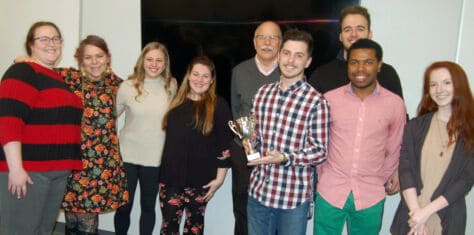WASHINGTON, PA (Feb. 3, 2020)—Looking at a national media landscape that seems defined by divisive arguments rather than productive conversation, students in Dr. Stevie Berberick’s COM 391 Audio/Radio/Podcasting class developed a simple goal: show how to engage ideological differences in an informed and respectful way, and use storytelling to do it.
The class – which won the PrezTech Challenge – designed The Cultural Edge podcast series as an informative, objective podcast between co-hosts who take on hot button issues that are central to debates on the national stage. Designed to mirror broadcast journalism, the podcasts were designed with a narrative structure in mind. Students worked in teams to discuss contemporary debates surrounding topics including immigration, marijuana legalization or prohibition, the Second Amendment, student loan reform, and free market logos, among other topics.
“The goal of this podcast is to educate listeners on a hot button topic,” said student Cassandra Muhr. “It is our job to give the audience correct information in order for them to form their own opinions on the topic if desired and if not, to just inform them of the issue. This is done so by researching the topic and presenting information for both sides.”
In addition to the extensive research the students had to do on their topics in order to present and support their arguments, they also had to consider principles of engagement in audio storytelling, including descriptive narration, complementary sound effects, and conversational debate between both sides.
“I believe it contributed most to the collaboration with peers in the development of shared knowledge, because of the time spent working with our partners and creating a civil discussion about controversial topics,” said student Sara Franco. “It gave us a platform to share our research on each subject and allows listeners to take that information and generate their own opinion.”
The project also involved a lot of technical learning. Students used either GarageBand or Audacity to create the podcasts, and also had to tackle the intricacies of recording: where to set the mic, adjusting volume levels in pre- or post-production, eliminating white noise, and experimenting with scripting styles.
While learning the technology could be tricky, students said the real challenge was that they were sometimes charged with debating a point they personally felt indifferent about, or even disagreed with. In doing so, the project taught them to consider new or different points of view.
“The hosts would have to understand the opposing beliefs of the audience in order to provide good content. The hosts must also be able to articulate their message well. This would require the hosts to speak clearly for the audience and coherently,” said student Tymothy Moyer. “The most important outcome that co-host podcasting relates to is the final one which requires students to work effectively with their peers on projects and within the learning process. Co-host podcasting requires effort from the two students, otherwise it falls apart.”
This project was a part of Washington & Jefferson College’s PrezTech Challenge, which challenges faculty members at W&J to create student projects that showcase innovative uses of educational technology and/or information literacy in the classroom.
Read more PrezTech Challenge Stories:
Transforming Environmental Data Into Music



